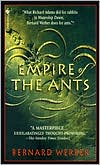Empire of the Ants
Here is the stunning international bestseller in the tradition of Watership Down but with a dark, original twist. Unique, daring, and unforgettable, it tells the story of an ordinary family who accidentally threaten the security of a hidden civilization as intelligent as our own—a colony of ants determined to survive at any cost....\ Jonathan Wells and his young family have come to the Paris flat at 3, rue des Sybarites through the bequest of his eccentric late uncle Edmond. Inheriting the...
Search in google:
Here is the stunning international bestseller in the tradition of Watership Down but with a dark, original twist. Unique, daring, and unforgettable, it tells the story of an ordinary family who accidentally threaten the security of a hidden civilization as intelligent as our own—a colony of ants determined to survive at any cost....Jonathan Wells and his young family have come to the Paris flat at 3, rue des Sybarites through the bequest of his eccentric late uncle Edmond. Inheriting the dusty apartment, the Wells family are left with only one warning: Never go down into the cellar.But when the family dog disappears down the basement steps, Jonathan follows—and soon his wife, his son, and various would-be rescuers vanish into its mysterious depths.Meanwhile, in a pine stump in a nearby park, a vast civilization is in turmoil. Here a young female from the russet ant nation of Bel-o-kan learns that a strange new weapon has been killing off her comrades. To find out why, she enlists the help of a warrior ant, and the two set off on separate journeys into a harsh and violent world. It is a world where death takes many forms—savage birds and voracious lizards, warlike dwarf ants and rapacious termites, poisonous beetles and, most bizarre of all, the swift, murderous, giant guardians of the edge of the world: cars.Yet the end of the female's desperate quest will be the eerie secret in the cellar at 3, rue des Sybarites—a mystery she must solve in order to fulfill her special destiny as the new queen of her own great empire. But to do so she must first make unthinkable communion with the most barbaric creatures of all. Empire of the Ants is a brilliant evocation of a hidden civilization as complex as our own and far more ancient. It is a fascinating realm where boats are built of leaves and greenflies are domesticated and milked like cows, where citizens lock antennae in "absolute communication" and fight wars with precisely coordinated armies using sprays of glue and acids that can dissolve a snail. Not since Watership Down has a novel so vividly captured the lives and struggles of a fellow species and the valuable lessons they have to teach us.VOYAJonathan Wells inherits a flat from his eccentric uncle Edmond, and moves in with his wife, Lucie, and his young son. He is warned never to go into the basement, but eventually does so in pursuit of the family dog. Soon, the rest of the family and a string of rescuers vanish as well. Jonathan's story interweaves with that of a russet ant colony, several members of which uncover a mysterious secret. The two stories finally connect in the conclusion when Jonathan's grandmother and two friends find that Jonathan, his family, and the fire and policemen sent to rescue them have taken up residence in a secret laboratory set up by Edmond where they are in communication with the ant colony. The ants abruptly cut off contact when the anthill is set on fire by two children from a nearby orphanage, leaving Jonathan and the rest stranded in their new abode. Werber, a scientific journalist who has studied ants for fifteen years as an avocation, makes the ant colony world of Bel-o-kan come alive, offering fascinating insights into ant life. Unfortunately, he is less successful with the story of the humans, and the characters never really come to life. The ending is unsatisfying, requiring too much suspension of disbelief, and is perhaps too abrupt. Still, the concept is interesting and unique, and much of the writing is strong and lucid. This title is suitable for larger libraries looking for something a little different. [Editor's Note: A more accessible tale of an ant colony, along the lines of the classic Watership Down by Richard Adams (Macmillan, 1974), is Robin Hawdon's A Rustle in the Grass (Dodd, Mead, 1984), recently reissued in paperback (Tor, 1994).]. VOYA Codes: 3Q 2P J S (Readable without serious defects, For the YA with a special interest in the subject, Junior High-defined as grades 7 to 9 and Senior High-defined as grades 10 to 12).
On the thirty-fifth floor, the fine covering of twigs produced a stained-glass window effect. The sun's rays sparkled as they passed through it, then fell like a rain of stars on the ground. This was the city's solarium, the "factory" producing Belokanian citizens.\ It was baking hot there, 38 C, as was only to be expected. The solarium faced due south to catch the heat of the sun for as long as possible. Sometimes, under the catalytic effect of the twigs, the temperature rose to as high as 50 C.\ Hundreds of legs were busying themselves. Nurses, the most numerous caste here, were piling up the eggs Mother laid. Twenty-four piles formed a heap and twelve heaps made a row. The rows stretched away into the distance. When a cloud cast a shadow, the nurses moved the piles of eggs. The youngest had to be kept nice and warm. "Moist heat for eggs, dry heat for cocoons" was an old ant recipe for healthy babies.\ On the left, workers responsible for maintaining the temperature were piling up pieces of black wood to accumulate heat and fermented humus to produce it. Thanks to these two "radiators," the solarium remained at a constant temperature of between 25 C and 40 C, even when it was only 15 C outside.\ Gunners were patrolling the area. If a woodpecker messed with them, there'd be trouble. . . .\ On the right were older eggs, further advanced in the long metamorphosis from egg to adult. With time and the nurses' licking, the little eggs grew bigger and turned yellow. After one to seven weeks, they turned into golden-haired larvae. That, too, depended on the weather.\ The nurses were concentrating hard, sparing neither antibiotic saliva nor attention. Not a speck of dirt must be allowed to sully the larvae. They were so fragile. Even conversational pheromones were kept to a strict minimum.\ Help me carry them into the corner...Look out, your pile's going to fall over...\ A nurse was moving a larva twice her length, a gunner for sure. She put the "weapon" down in a corner and licked it.\ At the center of this vast incubator were heaps of larvae on whose bodies the ten segments were beginning to show. They were howling to be fed, waving their heads and legs about and stretching their necks until the nurses let them have a little honeydew or insect meat.\ After three weeks, when they had "matured" nicely, the larvae stopped eating and moving. They used this lethargic phase to prepare for the coming effort, gathering their energies to secrete the cocoons that would transform them into nymphs.\ The nurses then carted the big bundles off to a nearby room filled with dry sand to absorb the moisture from the air. "Moist heat for eggs, dry heat for cocoons" could never be repeated often enough.\ Inside this incubator, the cocoons turned from bluish-white to yellow to gray to brown, like the philosopher's stone but in reverse, while a miracle took place inside the shells. Everything changed, the nervous system, respiratory and digestive apparatus, sense organs and shell.\ Once inside the incubator, the nymphs swelled within a few days as the eggs cooked and the big moment drew near. When a nymph was on the point of hatching, it was pulled aside, along with others in the same state. Nurses carefully pierced the veil of the cocoon, releasing an antenna or leg, until a kind of white ant was freed to tremble and sway. Its soft, clear chitin turned red after a few days, like that of all the Belokanians.\ In the midst of this whirlwind of activity, 327th was unsure whom to address. He threw out a little scent to a nurse who was helping a newborn ant take its first steps.\ Something serious is happening. The nurse did not even turn her head in his direction. She gave off a barely perceptible scent sentence:\ Hush. Nothing is more serious than birth.\ A gunner jostled him, hitting him gently with the clubs at the end of her antennae. Tap, tap, tap.\ Stop bothering people. Move on.\ His energy level was all wrong, the messages he emitted unconvincing. If only he had 56th's gift for communication! He tried again anyway with other nurses, but they ignored him completely. He ended up wondering whether his mission was really as important as he thought. Perhaps Mother had been right. Other tasks had priority. Perpetuating life rather than starting a war, for example.\ While he was thinking this strange thought, a jet of formic acid grazed his antennae. A nurse had dropped the cocoon she was carrying and fired at him. Fortunately, she had not aimed properly.\ He rushed to catch up with the terrorist but she had already darted off into the first nursery, knocking over a pile of eggs to block his way. The shells broke, letting out a transparent liquid.\ She had destroyed some eggs! What had gotten into her? There was panic, with nurses running in all directions, anxious to protect the gestating generation.\ Realizing he could not catch up with the fugitive, the 327th male tipped his abdomen under his thorax and took aim, but before he could fire she was struck down by a gunner who had seen her knock over the eggs.\ A crowd formed around the charred body. When 327th bent his antennae over it, he was no longer in any doubt. It smelled of rock.\
\ From Barnes & NobleThe Barnes & Noble Review\ I have a slightly eccentric cousin, who—like so many of us—is taking notes for the Great American Novel she will one day write. When she gets around to it, this masterpiece of hers will encompass all of her political theories, all her social commentary, and all her venom and pithy humor about the wicked ways in which the world works. She even has a working title for her book: "Well-Dressed Ants." Kind of catchy, I think. Whenever she talks about the project, she is flush with some new vignette to stir into the plot—a dash of Aldous Huxley here, a pinch of Erma Bombeck there, a generous helping of Orwell—and at times, I have to admit I'm quite sold. Caught in a Manhattan rush hour or stranded in the skyways of Minneapolis, watching people bustle past, feeling small and cold in the shadows of midtown anthills, I believe that, yes, she just might have something in her ant allegory. I'll call her out of the blue and tell her so—tell her to get cracking, so to speak—and I'll hear her silently nod on the other end of the phone and then ask me what, exactly, I am talking about.\ \ What I'm talking about—can't you see?—is our lives as insects!\ \ And she'll call me crazy or, depending on how polite she is feeling, eccentric.\ \ But now I have the hard truth of her ant parable demonstrated perfectly in two sensational new novels to bug her with, "The Life of Incents" and "Empire of the Ants." Both ingeniously work her "Well-Dressed Ants" territory, showing us all of the life struggles and lessons our arthropod brethren have to offer, as well ascreating parallel insect worlds in which all that is familiar has been recast as alien and strange. Both novels lean toward social satire and science fiction but in the same manner in which Gregor Samsa scuttles toward science fiction and social satire.\ \ Not only are people and insects compared and contrasted in Victor Pelevin's "The Life of Incents," but the young Russian novelist creates a fantastic Soviet-style resort town where humans and insects exist in the same character at more or less the same time. Pelevin, the author of the celebrated "Omon Ra" and "The Yellow Arrow," completely pulls off the impossible, balancing both the light-handed and the mocking sides of this satire.\ \ Even the seaside setting of "The Life of Incents" takes on a ruinous, conspiratorial feel common to the best children's stories, where the giant pits in town looked "less like a foundation dug for a new building than like a grave for a building that had died, or the excavated remains of an ancient city." Or, as Pelevin writes, "The main building of the old resort hotel, half hidden from view behind a screen of old poplars and cypresses, was an oppressive, gray structure which seemed to have turned its back to the sea at the bidding of some crazed fairy-tale conjurer."\ \ Pelevin the conjurer takes his reader through a romp-filled succession of interconnected chapters in which we follow a trio of mosquitoes as they bumble their misguided way through the resort, feeding, arguing, joking, and involving their fates with the other insects living there. Arthur and Arnold, the two Russians, and Sam Sacker, their American visitor, are variously presented to us as humans and then as insects, back and forth seamlessly, until the humans hold their mosquito traits and the mosquitoes have their human traits.\ \ It's a conceit that not only works to illuminate human nature conspiring with insect nature but also works as a terrifying and clever metaphor for post-Soviet Russia, shaded over in its "miserable hue of gray." As each chapter unveils the new trouble our mosquitoes buzz their way into, we are introduced to different species of insects, each with its own distinct foibles and wisdoms. We watch a father dung beetle initiate his young son into the ever-present ball of dung he must learn to live with each day. We meet a green fly named Marina and her struggles to dig a burrow in the world. We are tempted by the spiderlike Natasha. Along with the moths, we are attracted to the dangers of lights. By the end of this fascinating novel, we are left with a meticulously observed and biting vision of what has been left in wake of the collapse of the Soviet Union.\ \ If an overly manic Kafka comes to mind as you read Pelevin's cryptic and quirky novel, then surely Bernard Werber's "Empire of the Ants" begs obvious comparison to an insect-ruled "Watership Down." But unlike the classic story of our favorite rabbit warren, the richest, most enthralling aspects of Werber's novel surround the heroic epic of the Bel-o-kan ant colony and ants 327th and 103,683rd.\ \ Among the typical threats to the ant city—the constant battles with woodpeckers, the carnivorous plants, the distant enemy anthills, frogs, and other slave-driving insects—a deadly weapon has been unleashed upon the ant city. The single clue to the mystery is the distinctive smell of rocks. As counterpoint to this ant narrative is the human side of the story, called forth when the Wells family inherits an apartment in Paris. "ABOVE ALL," reads the one warning, "NEVER GO DOWN INTO THE CELLAR!" The family dog, however, disappears into the basement, and so will the rest of the family. The two stories dovetail as the ants are contacted or, if you prefer, as the humans are contacted.\ \ In addition to the gripping action-adventure story about the city of ants, "Empire of the Ants" is also satisfying in its fidelity to the ways of ant life. With countless facts about ant biology and behavior, Werber, a science journalist, will whet and then satisfy your appetite for the inner, scent-driven lives of the family Formicidae. For instance, "With their many-faceted eyes, ants do not see the same image repeated thousands of times but a single latticed image. They find it hard to make out detail but can perceive the slightest movement." Or, "Every ant had a kind of pocket in its abdomen, a second stomach that did not digest food but kept it fresh and intact indefinitely."\ \ I could go all day on details like those. And if you're anything like my cousin or me, you may even find yourself taking notes. These are well-dressed ants with a vengeance. And as I'll tell my cousin, the Great American Ant Novel has yet to be written, but wouldn't you know, its French and Russian counterparts already have been.—William Lychack\ \ \ \ \ \ \ VOYA - Donna Scanlon\ Jonathan Wells inherits a flat from his eccentric uncle Edmond, and moves in with his wife, Lucie, and his young son. He is warned never to go into the basement, but eventually does so in pursuit of the family dog. Soon, the rest of the family and a string of rescuers vanish as well. Jonathan's story interweaves with that of a russet ant colony, several members of which uncover a mysterious secret. The two stories finally connect in the conclusion when Jonathan's grandmother and two friends find that Jonathan, his family, and the fire and policemen sent to rescue them have taken up residence in a secret laboratory set up by Edmond where they are in communication with the ant colony. The ants abruptly cut off contact when the anthill is set on fire by two children from a nearby orphanage, leaving Jonathan and the rest stranded in their new abode. Werber, a scientific journalist who has studied ants for fifteen years as an avocation, makes the ant colony world of Bel-o-kan come alive, offering fascinating insights into ant life. Unfortunately, he is less successful with the story of the humans, and the characters never really come to life. The ending is unsatisfying, requiring too much suspension of disbelief, and is perhaps too abrupt. Still, the concept is interesting and unique, and much of the writing is strong and lucid. This title is suitable for larger libraries looking for something a little different. [Editor's Note: A more accessible tale of an ant colony, along the lines of the classic Watership Down by Richard Adams (Macmillan, 1974), is Robin Hawdon's A Rustle in the Grass (Dodd, Mead, 1984), recently reissued in paperback (Tor, 1994).]. VOYA Codes: 3Q 2P J S (Readable without serious defects, For the YA with a special interest in the subject, Junior High-defined as grades 7 to 9 and Senior High-defined as grades 10 to 12).\ \ \ Library Journal"Don't go into the cellar" is the warning given the Wells family as they move into the dingy Paris flat inherited from Jonathan's Uncle Edmund. But when the family dog disappears down the basement steps, the Wellses follow, one by one, into the mysterious darkness below. Uncle Edmund was an eccentric author and scientist whose particular passion was ants. Thus, it must follow that the mystery of the Wells's basement lies in the parallel universe of an exotic ant kingdom. Struggling to rebuild what was once a vast empire in the face of the terrors of contemporary human society, the ants are compelled to deal with cars, tools, and other technopredators. The sf movies of the 1950s are immediately brought to mind here. The one-dimensional humans definitely take back seat to the anthropomorphized ants as characters in this novel of survival. Werber tells us much more about the intelligent and highly structured world of the ant than we may care to know. Readers captivated by Richard Adam's Watership Down might be attracted by this premise but will quickly tire of the novel's uneven characterization and didactic style. Not recommended.Susan Gene Clifford, Aerospace Corp., El Segundo, Cal.\ \








